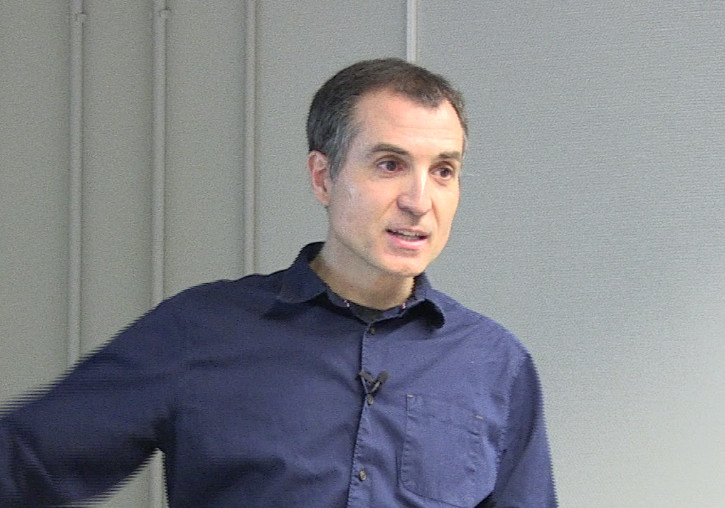Users
Social media
- More details here...
- Address
Parc Científic de la Universitat de València C/
Catedrático Agustín Escardino, 9
46980 Paterna (Valencia) Spain - Email:
iu.i2sysbio@uv.es - Phone:
(+34) 963544810
- Address
Links
Scientist Fernando Maestre explains the rules for a healthier work in the hypercompetitive research environment

Investigation & Education
Outreach
Scientist Fernando Maestre explains the rules for a healthier work in the hypercompetitive research environment

Fernando Maestre, one of the most important researchers cited in the world in Ecology and Environment, has participated in a seminar at the Institute of Integrative Systems Biology (I2SysBio, a joint center of the University of Valencia and the CSIC) in which he analyzed how to promote well-being in research work environments. The two final messages of Maestre's conference were widely commented on and applauded by the audience: “If you get sick or need help, your articles will not take care of you (people will!)” and “Our laboratories should be places to train scientists, not to destroy people.”
Fernando Maestre, distinguished researcher at the University of Alicante, was invited by the Institute of Integrative Systems Biology (I2SysBio) not to present his extraordinary work on the arid areas of the planet, but for his most recent role as champion of the idea that well-being in laboratories is not at odds with scientific productivity, quite the contrary. Maestre is the author of two texts with a fabulous impact on social networks: «Seven steps towards health and happiness in the lab» (published in Nature in 2018) and «Ten simple rules towards healthier research labs» (published in PLoS Computational Biology in April 2019, which currently has more than 125,000 visits).
The talk, on Thursday the 27th, began with a review of the various forms of pressure that research personnel receive as a brake on healthier work. Thus, he regretted that currently in professional promotion the number of articles published prevails to the detriment of their quality, he analyzed the problem of adequately establishing the authorship of the works and denounced the excessive hours that people work in some laboratories.
Faced with these situations, Maestre presented his rules for a healthier work before an audience composed mainly of research personnel in doctoral training and young scientists who work in the Science Park of the University of Valencia. Among other pieces of advice, he made reference to the fact that the research staff “works with you and not for you”, to the need for a collaborative environment in the laboratory instead of a competitive one, and to the importance of promoting professional development.
He also considered it necessary to recognize the contribution of people who have done less visible work (software development, staff who do not sign the articles…) or avoid comparisons between people who are doing research. Furthermore, Maestre recalled the difficulty of applying these ideas, given that in the end the academic community has to publish in a highly competitive environment.
The now director of the Laboratory of Arid Zones and Global Change at the University of Alicante also pointed out “the taboo” that exists in the world of science regarding cases of existing sexual, gender, racial and cultural discrimination. As he explained, 40% of these situations correspond to gender discrimination, especially against women, and he denounced the impunity of harassers for years. “Institutions should put an end to all situations of sexual harassment,” remarked Fernando Maestre.
In addition, in the interventions of the audience, mention was made of the difficulty of ending the dependence of the doctoral student on the person who directs him or her, since his or her academic prestige is relevant in the trajectory of those who begin their research career. Likewise, the need for all staff to internalize the ideas presented by Fernando Maestre was insisted on, so that research and leisure time can be more productive.


